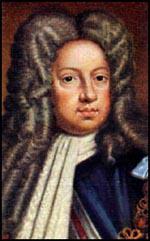King George II

George, the eldest son of George I and Sophia of Zell, was born in 1683. In 1705 he married Caroline of Ansbach. The couple had seven children: Frederick, William, Anne, Amelia, Caroline, Mary and Louisa.
George became king when his father died in 1727. He decided to maintain his father's principal minister, Robert Walpole.
In 1742 George became the last British monarch to take part in a battle when he commanded the British Army at the Battle of Dettingen. The following year war broke out between England and France. As France was a Catholic nation, it had always supported the Stuarts' claim to the English throne. King Louis XV realised that it would be in his interests if the Stuarts made another attempt to regain the throne.
Louis XV informed James Edward Stuart in 1745 that if he invaded England he would supply him with arms and ammunition. James was now fifty-seven years old and was not keen on becoming involved in another military campaign. However, his son Charles Stuart was more enthusiastic, and on 5 July he left France with 700 men.
Once in Scotland, Charles Stuart, who had been nicknamed Bonnie Prince Charlie, began building up his army. He was especially successful at persuading Catholics living in the Scottish Highlands to join him. In September, Charles was ready to take action. His first move was to capture Holyrood, the ancient palace of Scottish kings. The English army arrived soon afterwards but Charles' army had an easy victory at the battle of Prestonpans. Charles' 5,000 man army now marched into England and by December he reached Derby.
Charles had hoped that English Catholics would join his army. This did not happen. In fact, in many of the towns that he marched through, the crowds showed great hostility to Charles' army. Louis XV had promised Charles that 12,000 French soldiers would invade England in the autumn of 1745. However, Louis XV did not keep his promise. Although Charles still wanted to march on London, his military advisers argued that without the support of the French they were certain to be beaten. Reluctantly, Charles agreed to return to Scotland.
Another English army, this time led by the Duke of Cumberland, followed Charles back into Scotland. Completely outnumbered, Charles's army were chased into the Scottish Highlands.
In April 1746, Charles Stuart decided to turn and fight the English army. The two forces met at Culloden Moor on 16 April. Cumberland's army devastated the Jacobites and Charles was forced to flee from the battlefield. A reward of £30,000 was offered for his capture, but Charles still had many loyal supporters who were willing to hide him.
George gave the Duke of Cumberland instructions that the Scots had to be punished for supporting Charles. Many of those who had joined Charles' army were executed and their land was given to those who had remained loyal to the king. Scotsmen were also banned from wearing kilts and playing bagpipes.
During his reign the British army won important military victories at Plassey (1757) and Quebec (1759). George II died in 1760.
